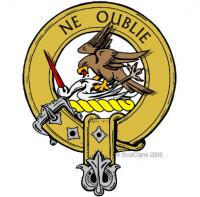
Clan Graham
There is a legend that says the Antonine Wall was broken by Greme, a great Caledonian chief, as he drove the Roman legions out of his country. This, unfortunately, might never be proven. From the records available, the first Graham known in Scotland was Sir William de Graham, a knight who accompanied David I, England’s premier baron, on his journey north to claim the Scottish crown.
In 1128 he witnessed the foundation charter of the Abbey of Holyrood. Sir William’s name can be traced back to the English manor of Grey Home, which is recorded in William the Conqueror’s Doomsday Book.
The first Earl of Montrose was created in 1504 of William, 3rd Lord Graham, who died fighting at Flodden in 1513.
But it was the 5th Earl and first Marquis, James Graham, who made the name legendary across Europe as one of the greatest generals ever. In 1644 and 1645, with the smallest of forces, he managed to effectively stop the terror of the Calvinists and Campbells. Pushing over the border, however, his tiny army was taken by surprise on the 13th September 1645. Although he escaped, his men and their families, who accompanied in those days, surrendered and were rounded up. At first General David Lesley was prepared to spare their lives, but the Calvinists persuaded him to slaughter every man, woman and child.
In Europe, Montrose was made a mareschal by the Germans, and a similar honour by the French, but he returned to Orkney in 1650 to recover Scotland for Charles II. He was betrayed and executed in Edinburgh like a criminal, with every possible degradation. His body parts were displayed in cities across the kingdom for ten years, till Charles II was restored and arranged for him Scotland’s greatest ever State funeral.
As well as a fighter, he was a poet and scholar, and on the eve of his death he wrote:-../../../scottish_history/scottish_unification/1689_killiecrainkie.html
Let them bestow on every airt a limb,
Then open all my veins that I may swim
To Thee, my Maker, in that crimson lake;
Then place my parboiled head on a stake,
Scatter my ashes, strew them in the air.-
Lord! Since Thou knowest where all these atoms are,
I’m hopeful Thou’lt recover once my dust,
And confident Thou’ll raise me with the just.
A later thorn in the side of the Calvinists was John Graham of Claverhouse, Bonnie Dundee to his friends, Bloody Claverhouse to his enemies. He died fighting in the pass of Killiecrankie in 1689 for the last Stewart King.
In 1782, James Graham, 3rd Duke of Montrose, persuaded Parliament to remove the law forbidding Scots to wear their tartan.







